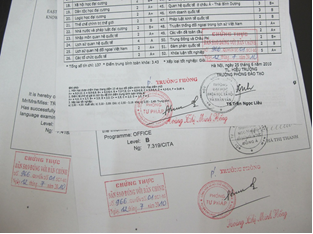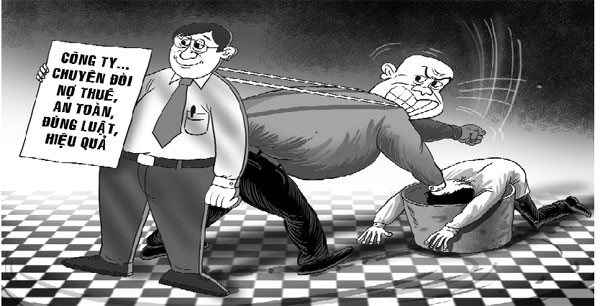On November 20, 2014, the National Assembly of the Socialist Republic of Vietnam, Term XIII, 8th Session, passed the Civil Status Law. The law takes effect from January 1, 2016.

Law on Civil Status 2014, with many new statutes, new classifications, and new procedures, has breathed new life into the registration and management of civil status, aiming to be closer to the people and better serve the needs of the citizens and related agencies and organizations.
To help readers and the public promptly grasp some new points of the Law on Civil Status 2014, below we outline some of the basic new points of the Law on Civil Status.
First, regulations on civil status registration contents
The Law on Civil Status 2014 has stipulated more clearly and specifically the contents of civil status registration; it has clearly delineated which events are to be Confirmed in the Civil Status Register and which events are to be Recorded in the Civil Status Register. Accordingly:
1. Confirmed in the Civil Status Register are the following civil status events: Birth registration; Marriage; Guardianship; Recognition of parent-child relationship; Change, correction of civil status, re-determination of ethnicity, supplementation of civil status information; Death registration.
2. Recorded in the Civil Status Register are changes in personal civil status according to judgments and decisions of competent state agencies, including: Change of nationality; Determination of parent-child relationship; Re-determination of gender; Adoption, termination of adoption; Divorce, annulment of illegal marriage, recognition of marriage; Recognition of guardianship; Declaration or annulment of a declaration of a person missing, deceased, or with limited or lost civil act capacity.
3. Recorded in the Civil Status Register are the events of birth registration; marriage; divorce; annulment of marriage; guardianship; recognition of parent-child relationship; determination of parent-child relationship; adoption; change of civil status; death of Vietnamese citizens that have been resolved at competent foreign agencies.
4. Confirmed or recorded in the Civil Status Register other civil status matters as prescribed by law.
Second, regulations on civil status registration authority
With the perspective of strong decentralization to local governments, from January 1, 2016, civil status event registration authority is implemented at 2 levels (district and commune levels), specifically:
- The People's Committee at the commune level has the authority to register the following civil status cases:
a) Birth registration; Marriage; Guardianship; Recognition of parent-child relationship; Death registration; Change, correction of civil status for persons under 14 years old; supplementation of civil status information for Vietnamese citizens residing domestically;
b) Record changes of individual civil status in the Civil Status Register according to judgments and decisions of competent state agencies, including: Change of nationality; Determination of parent-child relationship; Re-determination of gender; Adoption, termination of adoption; Divorce, annulment of illegal marriage, recognition of marriage; Recognition of guardianship; Declaration or annulment of a declaration of a person missing, deceased, or with limited or lost civil act capacity.
c) Confirm or record other civil status matters in the Civil Status Register as prescribed by law.
d) Register birth for children born in Vietnam with either parent being a Vietnamese citizen residing in border areas, and the other parent is a citizen of a neighboring country residing in border areas with Vietnam; marriage, recognition of parent-child relationship for Vietnamese citizens residing in border areas with citizens of neighboring countries residing in border areas with Vietnam; death registration for foreigners who reside permanently in border areas of Vietnam.
- The People's Committee at the district level has the authority to register the following civil status cases:
a) Register civil status events: birth, marriage, guardianship, recognition of parent-child relationship, death, supplementation of civil status information with foreign elements;
b) Record changes of individual civil status in the Civil Status Register according to judgments and decisions of competent state agencies, including: Change of nationality, determination of parent-child relationship, re-determination of gender, adoption, termination of adoption, divorce, annulment of illegal marriage, recognition of marriage, recognition of guardianship; declaration or annulment of a declaration of a person missing, deceased, or with limited or lost civil act capacity involving foreign elements;
c) Register change, correction of civil status for Vietnamese citizens from 14 years of age residing domestically; re-determination of ethnicity;
d) Record the events of birth registration; marriage; divorce; annulment of marriage; guardianship; recognition of parent-child relationship; determination of parent-child relationship; adoption; change of civil status; death of Vietnamese citizens that have been resolved at competent foreign agencies.
Third, simplified civil status registration procedures, minimizing unnecessary documents, and facilitating the right to choose the place and method of registering civil status events:
The law stipulates issuing only 2 types of original certificates: Birth certificates and Marriage certificates, while other civil status events, after the registration process, the registration requester is issued an Extract of the corresponding registered civil status event. The original extracted record can be certified as a copy.
Individuals have the right to choose their civil status registration agency, no longer being dependent on the place of residence as before. According to the law, individuals can register civil status at the registration agency where they have permanent residence, temporary residence, or where they are currently living and have the right to choose the registration method, such as direct submission, via post, or through the online registration system if the information technology infrastructure permits.
Fourth, the issuance of a personal identification number at birth registration:
The personal identification number is issued to every Vietnamese citizen upon birth registration, not duplicated in others, and is also one of the essential contents in the Birth Certificate, Birth Register, electronic civil status database, and the National Population Database. This number is also the citizen identification card number issued at the age of 14.
Fifth, clearly defined free civil status registration for people from families with meritorious services to the revolution, poor households, disabled individuals; timely birth and death registrations, guardianship, and marriage of Vietnamese citizens residing domestically.
Sixth, regulations on the civil status database and electronic civil status database: This is a breakthrough of the Law on Civil Status towards the Government of Vietnam's direction of an e-government. The civil status database is a national asset, storing all civil status information of registered individuals, as a basis for protecting the lawful rights and interests of individuals, serving information search requests, management, and policy formulation for economic and social development of the country. The civil status database includes the Register and electronic civil status database, which serves as a basis for the issuance of civil status extracts.
The electronic civil status database is an industry database, established based on the digitalization of civil status registration. The electronic civil status database is established to store, update, manage, and search for civil status information, serving online civil status registration needs; it is connected to provide and exchange basic civil status information of individuals for the National Population Database.
It can be said that the Law on Civil Status has brought a breakthrough in the institutional framework of civil status work. It provides a unified and synchronized legal basis for civil status registration and management, serving as an important foundation for building a professional and modern registration and civil status management system.
Source: Quang Binh Province electronic information portal
 Article table of contents
Article table of contents









